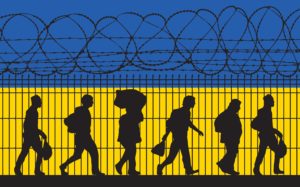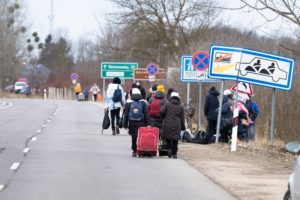INTERVIEW: How well has the EU has responded so far to the inflow of millions of Ukrainian refugees?
Maeve Patterson, what is the current situation with respect to refugees coming from Ukraine?
As of today, more than 4.2 million refugees have fled Ukraine, making this the fastest growing refugee crisis since World War II. An additional 6.5 million are estimated to be displaced within Ukraine, and a further 13 million people stranded in affected areas. Some 90 percent of those arriving are women and kids. We have to remember that behind each figure are individuals enduring unimaginable suffering that only grows as humanitarian needs increase.

Graphic: Shutterstock
How do you assess the EU’s reaction to the refugee crisis that has been growing dramatically in the past weeks?
At UNHCR, the United Nations refugee agency, we are really grateful for the support shown to date in Brussels and beyond. We’ve seen an outpouring of solidarity by states and people across Europe and globally. As well as extraordinary compassion shown by local responders and global supporters helping people fleeing the conflict – this has been in the form of accommodation, transport, food, and financial and material donations, to name a few. We have seen states mobilize and work together to welcome refugees. This level of solidarity should set the example for all refugee crises. It highlights Europe’s capacity for an organized and workable approach to asylum.
What are your expectations for the coming weeks?
The situation is evolving day by day. We are grateful that states have kept their borders open and put measures in place to welcome and share responsibility for refugees. We trust this support will continue. The response to date should set the example for all refugee crises.
People everywhere in the EU have rolled up their sleeves to help our Ukrainian friends.
Here, the Polish people are amazing.
This is why @JustinTrudeau and I are convening the #StandUpForUkraine pledging event in Warsaw.
The brave people of Ukraine deserve all our solidarity. pic.twitter.com/iqLWWChc1D
— Ursula von der Leyen (@vonderleyen) April 6, 2022
What has the UNHCR done to assist people fleeing Ukraine?
UNHCR has been in Ukraine for 30 years, and we currently have 154 staff there, with more on the way as and when the security situation allows, as well as remote support being provided. So, we are providing humanitarian assistance wherever necessary and possible, and to that effect, security and access for humanitarian efforts must be guaranteed. We are working closely with local authorities to set up and expand reception capacities for internally displaced people in safe areas of the country and transit locations. And we’re coordinating the provision of key protection services, including legal aid, psychosocial support, child protection and gender-based violence case management.

Photo: Shutterstock
We are also focusing our response on emergency shelter, cash assistance and provision of core relief items. This is under the overall leadership of the government and in coordination with the entire United Nations system. Our cash assistance program aims to reach 360,000 people with US$80 million worth of support over an initial period of three months to complement the Government’s own social assistance program.
Does the EU provide enough funding? Has the response by Brussels been adequate in your opinion?
The response to date has been most welcomed, in particular the recent and unprecedented decision by EU states to offer temporary protection, following the Commission’s proposal to activate the Temporary Protection Directive (TPD). The priority is now to ensure swift implementation. The recent Commission communication on welcoming those fleeing the war in Ukraine has also put forward a range of measures for EU member states to further support people fleeing Ukraine. It sets out for example measures which can facilitate access to housing, jobs, healthcare and education for people under the TPD fleeing Ukraine, as well as access to funding for states to welcome them. We hope these measures will facilitate further integration, and of course encourage states to take them forward.
The pledges made by several EU member states to transfer refugees from Moldova to their territory, under the auspices of the EU Solidarity Platform established by the Commission, is another concrete expression of solidarity. Looking ahead, a harmonized and coordinated approach to registration, reception and integration will be crucial to ensure ongoing responsibility-sharing across states and support for refugees. In this regard, the discussions at the recent meeting of EU interior ministers on advancing an IT solution to provide a centralized Europe-wide approach to registration is a good step that should facilitate refugee protection.

Photo: Shutterstock
What is being done at the United Nations level?
The UN has launched two coordinated UN emergency appeals calling for US$1.7 billion to help people across Ukraine and beyond. We are deeply grateful to the EU and other donors for the generous outpouring of support. This is among the fastest and most generous responses a humanitarian flash appeal has ever received. It is however important that additional funding is made available for the Ukraine situation, so that support is sustained for people caught up in other crises that should remain high on the agenda.
Ukrainians are granted temporary protection and are free to come to the EU countries, work, receive healthcare, etc. This stands in contrast to other asylum seekers, who do not have such rights. Do you think the EU makes an unfair distinction here?
When it comes to the TPD, which the EU is applying to people arriving from Ukraine, it’s a mechanism designed to address situations of mass influx, where individual status determinations may not be feasible or appropriate. For those asylum-seekers who are not covered, it is crucial that EU member states and other asylum countries continue to admit them to their territory, assess individual claims and grant international protection where it is needed.
The humanitarian spirit and solidarity shown so strongly these past weeks can and must be extended to all those escaping the violence, and citizens from other countries who were residing in Ukraine. Anyone in need of international protection at a country’s borders should be allowed access to territory to seek asylum and not be placed in detention. And please, let’s remember refugees in distress reaching Europe at other borders – the right to seek and gain asylum is universal and should never be contingent on nationality nor how someone arrives somewhere.
“We didn’t believe this could happen until we woke up one morning and heard the bombing.”
Ilona fled Ukraine for the sake of her children and to help others who were forced to flee.
She now supports fellow refugees at our cash enrolment centre in Poland. https://t.co/PhY2b1T3rs pic.twitter.com/jMJLHDGvUM
— UNHCR, the UN Refugee Agency (@Refugees) April 5, 2022
Do we see an EU-wide coordinated effort in response to the crisis, or is it largely handled by individual states?
We have seen an outpouring of solidarity towards refugees in the last weeks, as well as a great deal of responsibility-sharing across EU states. The TPD for example provides immediate protection as of 4 March to millions of refugees in the EU, and also enables states to share responsibility for doing so. This is already happening with some EU states providing free transport for refugees to move on to countries where they have links. Coordination on transfer arrangements within the EU is needed and UNHCR is supporting as part of the Solidarity Platform convened by the European Commission. We have really seen states come together and the recent response to the Ukraine situation shows what is possible in terms of a coordinated response – this should set the example for all refugee crises. Moving forward, we continue to support the Commission’s proposed Pact on Migration and Asylum – it’s an opportunity to move from any crisis-driven response to asylum and migration in the EU towards a sustainable, common, and comprehensive approach that works both within and beyond the Union.
Many Ukrainian refugees arrive in Poland, Romania and Hungary. What support do they get from UNHCR and from other agencies?
We have a longstanding presence in the region, working with national authorities on refugee related matters. In neighbouring countries, the response is coordinated through the refugee coordination model led by UNHCR, in support of national and local authorities and in close partnership with many other actors. We have significantly strengthened our staffing and scaled up our humanitarian response to bolster governments of countries receiving refugees from Ukraine in providing critical humanitarian and protection assistance and supporting authorities to increase their capacity to host new arrivals.
Close to 200 colleagues are now on the ground, with more being deployed to support. We have deployed coordination and protection experts including protection against sexual exploitation and abuse (PSEA) emergency coordinators in Hungary, Moldova, Poland and Romania. Along with our partners, we are conducting regular protection monitoring at the main border crossing points, transit and reception centres and through hotlines. We are also working to ensure that those arriving from Ukraine have access to information.
The Ukrainian refugees who are not made welcome – Third-country nationals fleeing the same war can find a very different reception in the EU https://t.co/mO7LRaNVtZ @valentinapop
— Martin Arnold (@MAmdorsky) April 7, 2022
What are the long-term prospects for Ukrainian refugees in EU countries? Should they be integrated in the host countries?
Obviously, what everyone is hoping for is peace. And as you can well imagine, the vast majority of refugees wish to return home as soon as possible. As such, while UNHCR works hard to protect and assist refugees around the world, our ultimate goal is to find solutions that allow people to rebuild their lives. One of these is integration. People rebuild their lives more quickly when they feel safe, live in decent conditions and can access their human rights, including the right to education.
When given the chance, refugees integrate and contribute greatly to their host societies. This is why we are encouraging states to take forward the measures proposed in the recent Commission Communication on Welcoming those fleeing War in Ukraine. It sets out for example measures which can facilitate access to housing, jobs, healthcare and education for people under the TPD fleeing Ukraine, as well as access to funding for states to welcome them – we hope these measures will facilitate further integration.
Maeve Patterson is senior communications officer with the UNHCR in Brussels. The interview was conducted on 6 April 2022 by Hélorie Duval and Michael Thaidigsmann.






